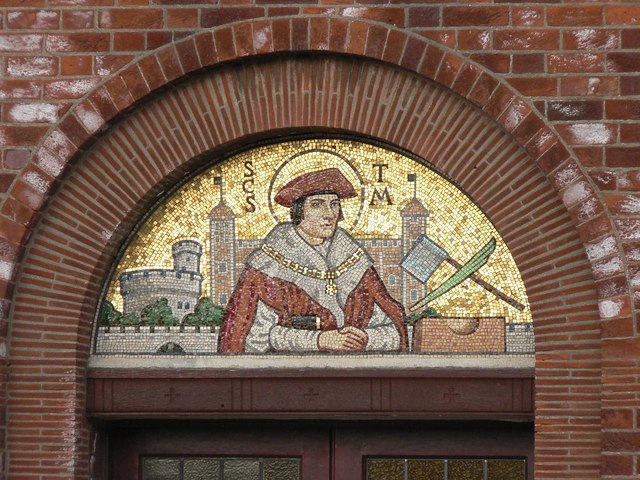Image Credit: Chris Downer / Iford: St. Thomas More – doorway detail
Listen to the Full Interview here
Julie has been homeschooling for twenty years. Five of her children have finished, and she now homeschools four; age seven, twelve, fourteen, and seventeen.
Julie speaks about how, when her eldest was four or five, he had already started learning at home with his two younger siblings, and she wanted to continue that. “I just didn’t like the idea of us sending him away to school for six hours a day to get an education. I thought, ‘we already have the perfect environment for education at home, with the people who love him the best.’” At home, she could educate how she wanted, and choose the curricula best for her children.
In school, children are away from home for a large part of the day. However, through homeschooling, “we could take our time at home, reading a lot of books, going on excursions, just spending great times together with my husband and the children, out in nature, learning about the Catholic Faith.”
Julie says, “If we make God first in our hearts, then that’s the basis for trying to pass the Faith on to your children.” God uses the Faith of the parents to instill the Faith in the children. Julie talks about “bringing it into daily life with daily prayer with the children, with Mass and the sacraments, with reading the lives of the saints…helping children realize there’s a great of witnesses around them, that the Saints are watching them and helping them…my husband has been especially really good at passing on knowledge in the area of apologetics.”
Now, Julie’s children are involved in the wider Catholic community, serving the Parish by helping run youth groups and Sacramental programs. Julie and her husband, Dean “tried to immerse them in the Church life, because we ourselves feel immersed in the Church life, and somehow the Holy Spirit has just used that and worked in their lives…the Church has served us and I guess they feel like they would like to serve the Church.”
Julie speaks about how the writing of the Saints “really inspired me in homeschooling and in family life.” She mentions a book called Story of a Family, by Fr. Piat, a book about St Therese’s family, which “just showed me how much they [Louis and Zelie Martin] loved their children, and how they wanted to bring them up close to the Lord.” The Martin parents were careful about their children’s education. Julie “gained strength from Zelie’s writings…I knew I wanted to have a family life like that.”
Julie was also influenced by a book called Born for Friendship: the Spirit of Sir Thomas More, by Bernard Basset. She says, “his children learned at home. He had tutors for his children. And he probably would have liked to teach them himself, but he was often away on business.” St Thomas advised his children’s tutor, “warn my children to beware of pride and haughtiness, and rather to walk in the pleasant meadows of modesty, to put virtue in the first place, learning in the second, and in their studies to esteem most whatever may teach them piety towards God, charity to all, and Christian humility in themselves.” Julie says, “that’s what I really want for our family.” For St Thomas “learning was to cultivate the soul” and he had a very peaceful, Faith-filled atmosphere in his home, which Julie tries to cultivate in her own home.
Some other resources Julie has used are MODG, Seton, Formed, and a book called A Charlotte Mason Companion, by Karen Andreola. Julie says, “I think it’s really good to try and glean the wisdom of the people from long ago”
Julie says, “we’ve always liked the children to stay active, because we think that’s important for health, and Dean and I were quite sporty when we were younger, so the children usually play a winter sport, but we definitely don’t like to overdo it or have it overrunning our family life…you’ve got to decide how much you’re going to do of it because it’s always trying to drag you in to do more and more.” She says, “a few of our children especially..have gone on to excel in some of those areas and homeschooling’s been really useful for that.” It gives them flexibility to train when they want to, whether it is in the morning before study, or later in the day. It also prompts them to take initiative. She mentions that having two older brothers to play with really helped her daughter excel in basketball.
The Mischewskis have also done acting and drama. They were involved in a drama group. When the eldest four kids were four, six, eight, and ten, they loved Narnia, and spent hours practising and acting out the The Lion the Witch and the Wardrobe. Now, some of the children are involved in a choir.
Julie says, “I’ve never really been too worried about socialization…there’s so many things you could do, especially in Canterbury, that you could be doing something every day, all day, extracurricular, and that you just won’t get your schoolwork done.” They choose several things per term, such as swimming lessons, choir, public speaking group, and Christian family meetups. Julie says “the greatest socialization is going on in your family, in your domestic Church, because you’re there for the sanctification of each other.”
Julie mentions that Laura Ingals Wilder was “isolated for months on end, and I don’t think you could say that Laura Ingals Wilder wasn’t well-socialized” The Mischewskis have had opportunities to socialize with school children through sport, but “socializing with different age levels” is also important, and the kids often get to do this when they have adults over for dinner, who the kids might not know.
Homeschooling can be exhausting sometimes, especially when you have lots of kids under age ten, and are waking up in the night to feed the baby. Julie also says, “I’ve got the benefit now of looking back, and seeing how the children…managed to get to adulthood okay,” something she didn’t have when her eldest was five and she first started homeschooling. “You doubt yourself,” she says, “even today…I feel like I’m not doing enough academically.” Sometimes it can be tricky to homeschool when you have toddlers; “I love them so much, but they make homeschooling really hard, they want to join in, and get up on the table…For us it was always important that every child was happy…sometimes [this meant] we would just have to stop work and go down to the park.”
Some of the highlights of homeschooling for Julie were “seeing our children just become each others best friends, enjoying the close family bond that we’ve had, seeing our children care for each other, love each other, become each other’s best friends, getting on well together, having happy family life…seeing the children’s Faith grow…seeing that they have Faith, meaning, joy, hope, security love…and I think homeschooling has helped that.” She also mentions, “spending lots of great times together doing things, [homeschooling] gives you a lot of freedom to do things…you don’t have to stick to school terms if you don’t want to, you can go on trips if you want to.” While homeschooling, she is “learning with the children. Books that I didn’t read when I was a girl, things that I didn’t learn, my kids are teaching me now.” Together, they read aloud, stories about the Saints and great literature.
Julie’s advice is, “as homeschooling parents you’ve got to realize that you’re in it for the long haul, and so you don’t want to burn out early on…You’ve got to look after yourself, you’ve got to look after your spouse. You want to have a strong relationship with your husband, so your children see that and they can gain security from that…Work together as a team, you and your husband.” As a mum, you should “keep replenishing your soul with good things from God” Spend time in prayer daily, grow in your Faith and grow intellectually, pursue your hobbies. Julie tries to read every day, often scripture. She says, “decide to love your vocation as a wife and a mum…realize that the joy of the Lord is our strength…It does get easier as you go on, and you look back and you see that the children have come through okay.”

